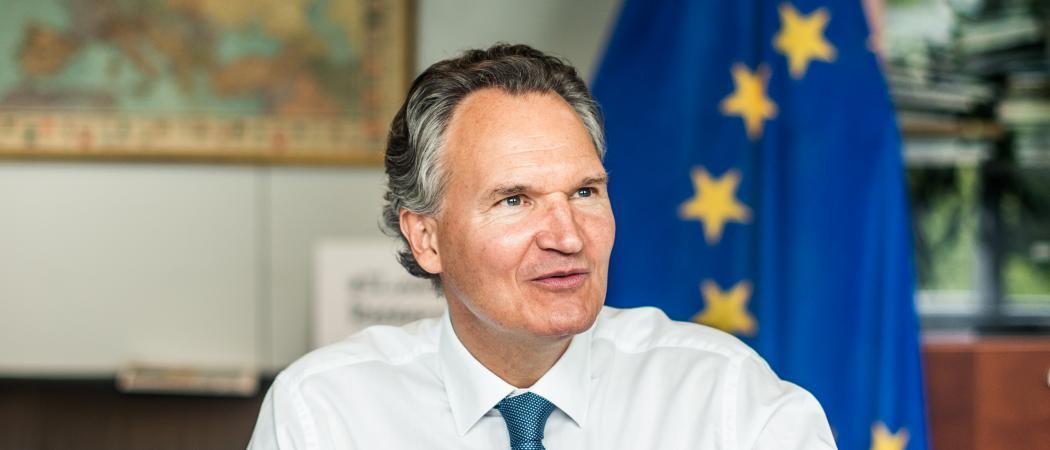The resilience of Europe’s innovation ecosystems depends on the financial commitments governments are willing to make in times of crisis

Robert-Jan Smits.
COVID-19 may have brought academic/industrial research cooperation to new levels, but researchers wonder whether the upcoming recession will hit R&D budgets and lower the appetite for international collaboration.
Research into COVID-19 is taking precedence over work in any other fields. Governments all over the world have introduced travel restrictions and shut down campuses and laboratories working on any projects not related to the pandemic. The lockdown has stifled supply chains and slowed down R&D projects in companies too.
Researchers in universities and companies alike are urging policy makers to look at how at to ensure that the severe short-term impact of these measures does not result in permanent damage to Europe’s research and innovation hubs.
As one case in point, Eindhoven University of Technology is at the heart of a regional innovation ecosystem involving companies that produce half of patents in the Netherlands and which report €50 billion in turnover per annum. The university has contracts with firms in the region and its students are trained to work on R&D projects in partnership with them.
Eindhoven University president, and former EU R&D chief, Robert-Jan Smits, said the cooperation and interaction with companies in the Eindhoven region has never been better, with university and industry R&D teams working together to address the pandemic and its effects. “We are joining forces to see what we can do to help overcome the crisis,” said Smits.
But this close cooperation with industry is a strength which a recession could turn into a potential vulnerability. “We are completely integrated in this innovation ecosystem,” Smits told a Science|Business webcast meeting on Wednesday. “You can also imagine the vulnerability of that and how the current crisis is affecting us since we are so much interconnected with high-tech companies,” he said.
Adding to these pressures, a lot of universities in Europe face disruption to the flow of students from China and India. At Eindhoven, 50 per cent of PhD students are from outside Europe. Smits estimates it will be at least two or three years before it is possible to attract them back. “We might see fewer international students for years to come,” he said.
Many research institutions have been forced to mothball research that is not directly related to COVID 19. While the Swiss Federal Institute of Technology (EPFL) is now “gradually getting back in gear,” vice president for research Andreas Mortensen said the institution is preparing for the long-term economic impact of the pandemic.
The temporary inability to connect with partners is not an issue, but Mortensen warned the success of collaborations between research institutions and industry will hang on the economic conditions after the pandemic slows down. “I worry more about financing tightness,” he said.
Looming recession
So far, Smits said, partners are keeping to existing contracts with the university, but he fears the inevitable post-pandemic recession will have consequences for university agreements with companies. It will be more difficult for students to find industry placements or to set up joint R&D projects with companies. “We are fearing that once the recession hits, we are going to face trouble as a university,” he said.
A recession could force high-tech companies to rethink their strategies said Smits. “The departments which are cut most often in times of crisis by companies are R&D departments.”
The first to take the economic hit are start-up companies that are now searching for funding. In addition, some research projects could fail because of the temporary lockdowns. “There are some very hard-hit actors in the ecosystem,” said Mortensen.
Call for stimulus
To mitigate both the short- and long-term damage of the crisis, the EPFL is calling for action from governments to strengthen their commitment to funding innovation ecosystems. “I expect governments to react accordingly. Failing that, the damage will be long term,” said Mortensen.
Secure funding would help researchers in publicly-funded institutes to continue collaborative projects with large companies. Salah-Dine Chibout, global head of discovery & investigative safety at Novartis said the coronavirus pandemic will not be the last global problem and addressing this and future crises will require continued commitment to international R&D cooperation. “Scientific interaction still is going to be important,” he said.
Chibout said large companies need to be able to collaborate with public research institutes and called on governments to continue investing in them regardless of who is in power. “We need to have continuous investment that is going to last for some time,” he said.
The resilience of Europe’s innovation ecosystems depends on the financial commitments governments are willing to make in times of crisis, said Smits. “It is essential that governments at national level, but also the EU, kick in with big [stimulus] packages.”
This article was updated 24 April.





 A unique international forum for public research organisations and companies to connect their external engagement with strategic interests around their R&D system.
A unique international forum for public research organisations and companies to connect their external engagement with strategic interests around their R&D system.